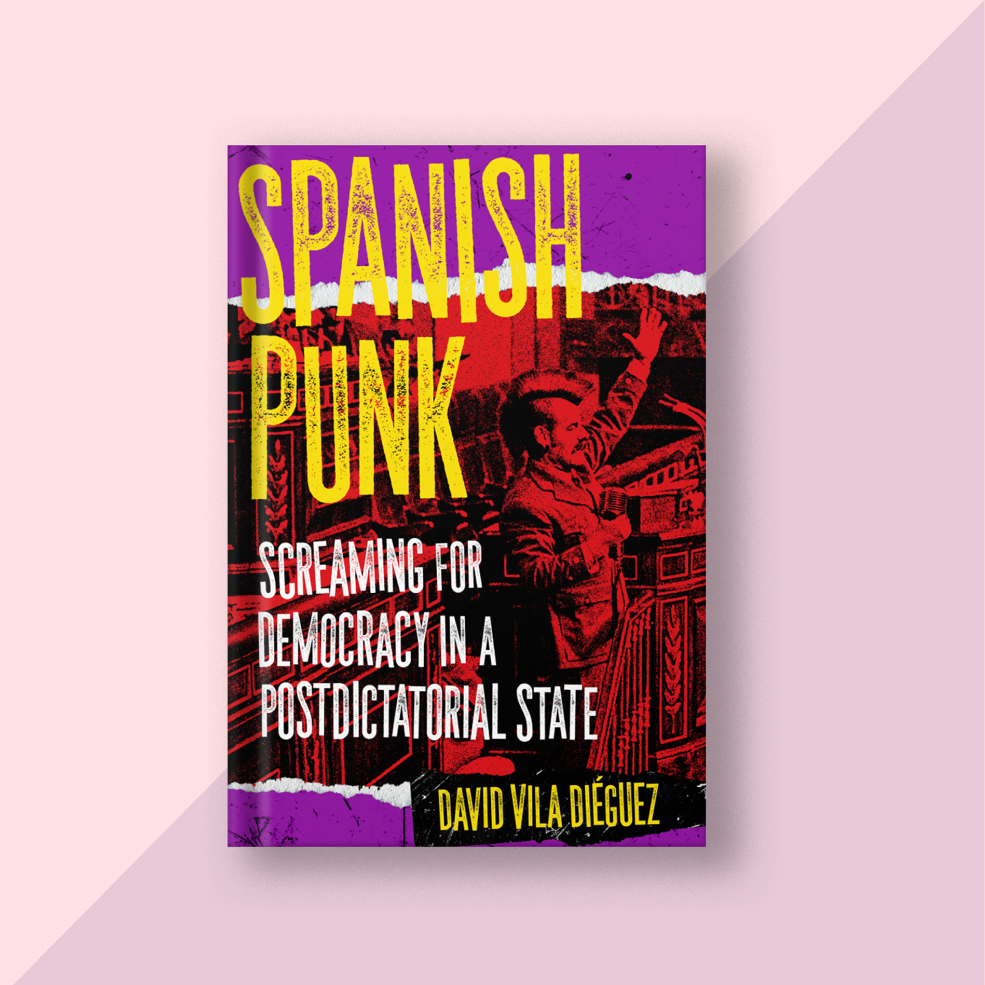
Meet The Rumba Madre
September 6, 2024
Vivir Sin Ti – Nancy Sanchez, The Rumba Madre
October 23, 2024Spanish Punk: Screaming for Democracy in a Postdictatorial State

Vila Diéguez, David. Spanish Punk: Screaming for Democracy in a Postdictatorial State. P.M. Press, 2025
Overview
It’s 1975. Spanish dictator Francisco Franco dies and Spain begins transitioning to a democratic state. Spaniards are faced with a titanic task: they need to design a new democratic state after an almost forty-year-old dictatorship. What should this new state look like? What would make it a “democratic” one? These and similar questions triggered many heated discussions over the next few years. It is also during this time that punk culture developed in Spain and—as one would expect—the action of questioning and challenging the new state being created became a defining characteristic of the movement.
Taking the unique case of Spanish punk as its object of study, Spanish Punk: Screaming for Democracy in a Postdictatorial State explores the political relevance of the punk phenomenon in Spain and pays special attention to its connections with contemporary social and political movements and antiestablishment political identities. Combining textual, historical, philosophical, and musicological readings, this book shows that punk represents a determinant cultural glue that kept many political movements together and the cultural axis from which many of the contemporary social movements emerged. To do so, it studies punk through music, fanzines, testimonies from various people involved in Spanish punk culture, an analysis of the ways of life derived from it, and more. This long overdue study of Spanish punk fills an important gap in punk-related scholarship as well as in Spanish cultural studies.
Praise
“Spanish Punk is a well-researched and laid out study of a subculture that has resonated with people around the world. How punk found a foothold amidst the Spanish political climate of the ’80s is an important chapter in its history and will not be forgotten thanks to David Vila Diéguez.”
—Shawna Potter, front-person for War On Women and author of Making Spaces Safer: A Guide to Giving Harassment the Boot Wherever You Work, Play, and Gather
“Spanish punk, grown from anti-fascist roots, quickly outgrew its initial music into its own politically relevant culture. Spanish Punk: Screaming for Democracy in a Post-Dictatorial State examines the political significance of punk in Spain, challenging those who tried to reduce the repressed youth and marginalized as apolitical nihilists. This book is a study that looks broadly at the messages, artifacts, and personal testimonies through theoretical and analytical lenses. Especially relevant to punks worldwide witnessing the rise of rightwing populism, Spanish Punk is a timely, historic, thrilling read. Up the reading punks!"
—Jessica Mills, author of My Mother Wears Combat Boots: A Parenting Guide for the Rest of Us
“Spanish Punk: Screaming for Democracy in a Postdictatorial State is a compelling and essential contribution to punk scholarship, highlighting the empowering and revolutionary nature of Spanish punk culture. David Vila Diéguez charts a historical analysis of the development of Spanish punk culture following the Francoist dictatorship, documenting music, zines, and scene culture. He contextualizes Spanish punk culture within a broader framework of cultural studies and anarchist studies and draws upon theorists such as Walter Benjamin, along with work from subcultural scholars Crucially, this book elevates anticapitalist and antineoliberal actions that coordinate and calibrate across contemporary intersectional social movements and politics. Engaged agency and direct action reverberate throughout this book, making it an essential text.”
—Caroline K. Kaltefleiter, coeditor of the Punk and Anarchism book series, director of the Anarchist Studies Research Program, SUNY Cortland
“Spanish Punk should prove a fascinating read for anyone interested in punk beyond the well-documented US and UK contributions to the subculture. Focusing on post-Franco Spain, David Vila Diéguez weaves musicology, philosophy, and historical contexts into a compelling tapestry of a punk movement that emerged in the wake of literal fascism. He describes the sociopolitical and economic climate, breaks down lyrics, and even goes so far as to analyze album art as one might a painting. Vila Diéguez’s approach is academic, intellectual, and, most importantly, captivating.”
—Kyle Decker, author of This Rancid Mill
“Spanish Punk is an insightful history that presents a scholarly examination of the rise and legacy of the movement’s ‘rupturist discourse’ that challenges Spain’s post-dictatorial state including Spain’s transitional period from a Francoist regime to a democratic state in the 1980s. Vila Diéguez illustrates the antitransition, antifascism, anticapitalist, and antineoliberal politics central to Spanish punk. Moreover, the book underscores the crucial role of working-class Spanish and Basque punk artists and bands such as Kortatu, Eskorbuto, and La Polla Records. Compiling a critical archive of newspapers, fanzines, music, lyrics, and album cover art, Vila Diéguez demonstrates how punk is a bed rock in Spain’s past and contemporary social movements.”
—Susana Sepulveda, visiting lecturer, gender and sexuality at the University of Nevada, Las Vegas
“A fine journey through a misunderstood and ignored punk epoch that needs a searchlight just like this to illuminate the cultural concerns and political issues, regional conflicts and fragmented history. With a knack for both academic insight and observational detail, seen in a lens on La Polla Records and others. Spanish Punk is must-have for those seeking to understand how punk unfolded in a crises ridden time and place struggling to escape the throes of fascism.”
—David Ensminger, author of Left of the Dial: Conversations with Punk Icons
“David Vila Diéguez has brilliantly captured a turbulent point in Spanish history when punk rock culture helped to open some eyes and facilitate change. It is always inspiring to be reminded that the punk ethos is universal.”
—Jason Lamb, author of NoMeansNo: From Obscurity to Oblivion: An Oral History
“Too few books about music consider the relationship between music and the state. This relationship is nonetheless of great significance. It is expressed in patriotic anthems and martial hymns, of course. But the relationship between music and state is also one of intense rivalry because music challenges the state's claims to legitimacy, mocking its pomposity, ridiculing its hypocrisy and, in some cases, calling for its overthrow. David Vila Diéguez has written a book that takes this relationship very seriously indeed, providing abundant evidence and fascinating documentation to support his claim that music can, and will, be a crucial component of revolutionary struggle. I recommend it highly.”
—Mat Callahan, author of The Explosion of Deferred Dreams
“An insightful dissection of Spanish punk and its various factions, with an equally riveting examination of the politics that influenced the emergence of this multi-faceted music scene. David Vila Diéguez merges history with cultural criticism to illuminate a significant era in Spain that brought forth one of the most influential punk movements in the world. This book is a quintessential must-read for punk history nerds and fans of Spanish punk.”
—Stephanie Mendez, award-winning music journalist and producer
“Before I read this book, I could count on two fingers the number of Spanish punk bands I’d heard about and listened to (Kortatu and Negu Gorriak). I knew there was a lot more to know than the stuff I’d once learned from the scattershot and often unreliable international ‘scene reports’ in Maximum Rocknroll, but it wasn’t until reading Vila Dieguez’s book that I could begin to construct a rough idea of how important punk was to a country that, following the death of a dictator, had to undergo a huge cultural, social, and political change. The ins and outs of that change—the Transition—put Spanish punk in a unique and challenging position, one which this book tries to get to the heart of. It’s fascinating and informative, and despite still only knowing two Spanish punk bands I can hopefully now emerge from under my Brit/US-centric cultural shell and start to understand how, in Spain, a politicised, negationist and downright angry version of punk could attempt to influence the social movements and politics of a generation.”
—Boff Whalley, Chumbawamba and author of But: Life Isn't Like That, Is It?
“So many punk books fixate on the London-NYC-San Francisco nexus. Spanish Punk broadens the lens and reminds the reader how punk has always been a scream for radical democracy.”
—James Tracy, coauthor of No Fascist USA!: The John Brown Anti-Klan Committee and Lessons for Today’s Movements

